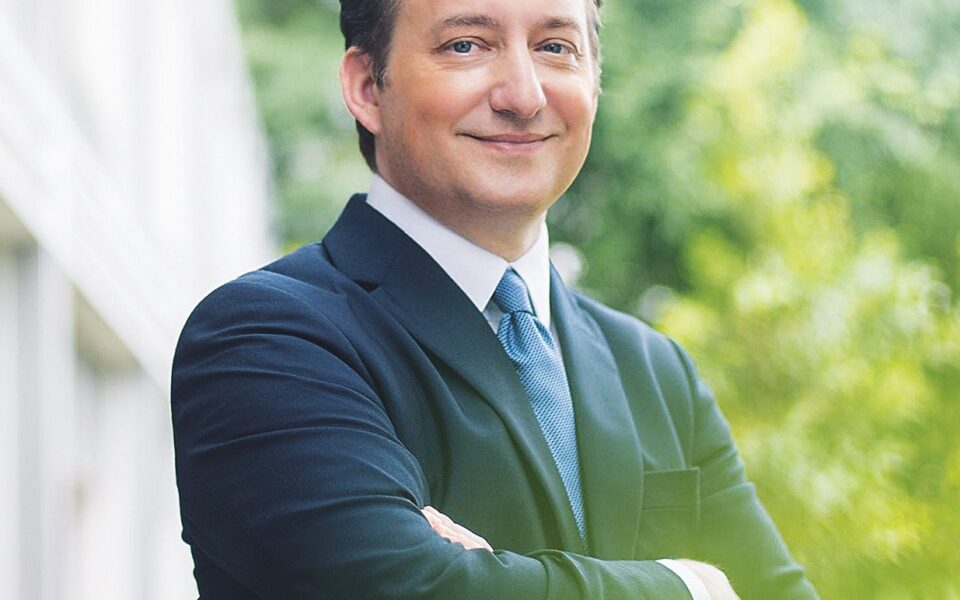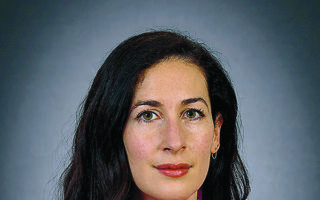Yale strengthens ties with University of Athens
Dean eyes collaboration in areas of public health and environment

Pericles Lewis, Douglas Tracy Smith Professor of Comparative Literature and Professor of English at Yale University, serves as dean of Yale College. He owes his Greek name to his father’s love for the Greek historian Thucydides. He relies a lot on technology, but he does try to spend some time away from it “in order to think more clearly,” He is after all concerned about technology taking a toll on our attention spans.
Speaking to Kathimerini, Lewis says that in his view the ideal educational system combines public and private universities, guarantees the independence of teaching staff, and is designed to quickly adapt to changes happening around us.
Lewis was recently in Athens to deliver a speech at an event organized by Yale Club Greece. During the event, which was held with the support of Accenture, he took part in a conversation with Kathimerini’s Executive Editor Alexis Papachelas.
Before we start, I can’t help but dwell on the fact that your name is Greek, Pericles. How did that happen?
Well, in the 1960s, around the time I was born, my parents were very interested in Greek history. In particular, my father studied political science and Classics and read a great deal of Thucydides. So they named me after the leader of the first democracy.
In Greece, an effort is in progress to upgrade the quality of higher education. How would you describe the formula for a successful educational organization?
It’s essential that faculty have the autonomy to establish the course of study and to pursue research without outside interference; competitive admissions should encourage the faculty to provide the kind of education that will meet student needs and demands. Universities do need to be responsive to student expectations. The government should provide oversight in terms of ensuring quality of the educational program through some form of accreditation but should ideally leave the universities a good deal of autonomy in how to deliver the educational program.
An issue that occasionally concerns the political system in Greece is the public vs private education dilemma. How do you approach this discussion?
In North America, many of the oldest universities were founded in collaboration with the churches, or as private philanthropies. In the United States, these mostly became private, self-governing nonprofit foundations. Starting in the 19th century, the United States also founded many great public universities. In Canada, the older institutions gradually came to be primarily state-supported. I think a mix of public and private is effective; private, nonprofit universities work well where there is a strong tradition of philanthropy and where students and their parents are willing to pay higher tuition fees, which in turn allows for greater investment in education.
Equal access to education is a fundamental challenge for democracies. What kinds of policies can increase the participation of the economically weaker in high-quality education?
A key factor, obviously, is government support for higher education. Programs that either make tuition and cost of living affordable or make loans easy to repay can be helpful. Potential students also need to be convinced of the economic benefits of pursuing higher education rather than entering straight into the labor market. Adequate salaries for faculty can also help to attract strong candidates to teach.
The rapid development of technology is transforming business and the labor market accordingly. How are these changes affecting universities’ mission to shape modern skills?
Ideally, universities should teach skills that can’t be done by a computer. Those include learning how to program computers but they also include thinking critically about social problems, conducting high-level scientific research, and writing effectively. We should turn away from memorization and towards developing higher-level thinking skills.
Some worry about the impact of AI tools – ChatGPT – on education. Others believe that universities should embrace artificial intelligence as a powerful tool of the 21st century. What is your opinion?
I agree that artificial intelligence is a powerful tool, just as calculators and computers were in the 20th century. AI does present a challenge if we are asking our students to do relatively straightforward writing tasks and if we are worried about cheating (which is indeed a problem). Ideally, we should be aiming to teach students to write at a level well beyond what ChatGPT can currently do. One possibility is to let students use ChatGPT for a first draft but then ask them how to improve on whatever ChatGPT produces.
In recent years there has been an impression that the humanities are receding in relation to technological and business studies. What are your thoughts on this development?
We have certainly seen this in the United States. Understandably, students tend to look for educational programs that they think will help them find jobs, and so programs that prepare them for careers in finance and technology are particularly popular. At Yale, one of our goals is to give students a well-rounded education, so that even our students majoring in economics or computer science will get some exposure to the humanities. And vice versa – our humanities students study some science and social science. We believe that this broad education prepares students well not only for the job market but also for later contributions to society and the economy.
The penetration of technological applications into everyday communications makes them faster and more synoptic. Some worry about the impact on the evolution of language as well as on the structure of human thought. Are you one of them?
I do worry about our attention spans. In the 19th century, people read and wrote long novels. I don’t have a lot of evidence for it, but I think people are more likely to read and write very short communications now. For myself, I do use a lot of technology, but I try to spend some time away from technology every day in order to think more clearly.
As part of an initiative involving a total of 30 foreign universities, the Greek government sought a partnership between the University of Athens and Yale. What is this collaboration about and what is the goal of this program?
The goal of this program is to collaborate on solutions in areas of public health and the environment. These are areas of high priority for both Yale and the University of Athens. Yale has a long tradition of engagement with Greece, including many excellent Greek students, alumni, and faculty members. We’re delighted to be pursuing closer partnership with the University of Athens.





